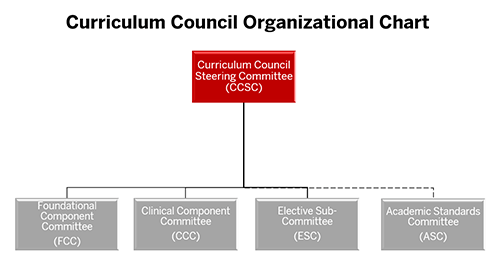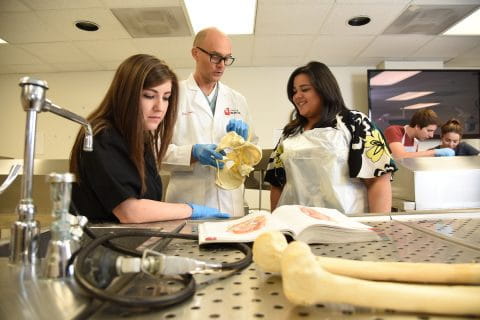The Curriculum Council Steering Committee (CCSC) oversees and enhances the MD curriculum at IU School of Medicine, setting policies and ensuring continuous improvement.
The Curriculum Council Steering Committee oversees the design of the school’s curriculum for medical students. The CCSC identifies strategic curricular directions, ensures that the IU School of Medicine curriculum reflects the broader school education mission and is attentive to national trends in medicine and medical education. The CCSC actively manages the curriculum at all nine campuses to ensure implementation of priority curricular initiatives, a robust statewide curriculum with appropriate attention to curricular gaps and unwanted redundancy, equivalency of the curriculum and attention to LCME Standards. The CCSC reviews data at specified intervals to monitor and evaluate the curriculum as a whole and make informed decisions to enhance, coordinate and ensure coherence of the educational program.
The Academic Standards Committee is charged with implementing a systematic evaluation for the curricular components (courses and clerkships) to ensure adherence to the institutional learning objectives and curricular policy; comparability of instruction, assessment and outcomes; and equivalency in grading.
The Clinical Component Committee oversees the creation, implementation and review of clinical science education at IU School of Medicine. The committee focuses on identifying areas of need, reviewing curricular initiatives and evaluating outcomes. The Clinical Component Committee recommends policy on matters relating to the clinical science curriculum and reports to the Curriculum Council Steering Committee.
The Elective Sub-Committee oversees the review and approval of all medical student electives. This subcommittee also reviews special electives, including all international electives, for individual students. Review and revision of the elective catalog is also an ongoing task for this group.
The Foundational Component Committee oversees the creation, implementation and review of basic science education at IU School of Medicine. The committee focuses on identifying areas of need, reviewing curricular initiatives and evaluating outcomes. The Foundational Component Committee recommends policy on matters relating to the basic science curriculum as a whole and reports to the Curriculum Council Steering Committee.

Bylaws revised 9/13/2018, 06/29/2022
Bylaws of the Curriculum Council Steering Committee at Indiana University School of Medicine
Article I. Purpose
The Curriculum Council Steering Committee (CCSC) is the standing committee created by the Faculty Steering Committee (FSC) in its bylaws that is responsible for the oversight of the MD curriculum at IU School of Medicine. It is the faculty body that manages, evaluates, and continually improves the medical curriculum as is required by the Liaison Committee for Medical Education (LCME). The CCSC sets curricular policy for education and has oversight responsibility for ensuring compliance and comparability. The CCSC reviews data at specified intervals to monitor and evaluate the curriculum as a whole and makes informed decisions to enhance, coordinate and ensure coherence of the educational program.
Article II. Membership
Section A. Leadership
The CCSC will be led by two co-chairs, one of which is appointed by the Executive Associate Dean for Faculty Affairs and Professional Development (FAPD) on behalf of the Dean of IU School of Medicine, in consultation with the Executive Associate Dean for Educational Affairs. The other co-chair will be a member of the Office of Medical Student Education appointed by the Senior Associate Dean for Medical Student Education in consultation with the Executive Associate Dean for Educational Affairs.
Section B. Voting members of the CCSC
-
Dean-appointed committee members
Acting as the Dean’s designee, the Executive Associate Dean (EAD) for Faculty Affairs and Professional Development consults with committee chairs and the Executive
Associate Dean for Educational Affairs in the appointment of committee members to ensure that committees are diverse and representative of key stakeholder groups including a librarian/library representative. Each spring, committee chairs are asked to review their current rosters with consideration of diversity in terms of gender, race/ethnicity, department, degree (i.e., PhD, MD), and campus. Unless otherwise stated on the EAD appointment letter, members will serve a two year term with eligibility for reappointment. -
Elected faculty members
The IU School of Medicine faculty elects two members per year to serve in two year terms on the CCSC on as wide a representational basis as possible. The election procedures are described in the FSC constitution and bylaws. -
Medical student members
As described in the Medical Student Council (MSC) bylaws, two students per year are elected to serve two year terms on the CCSC. The committee co-chairs may choose to request additional medical student membership to ensure representation of all curricular phases.
Section C. Ex Officio members of the CCSC
Committee membership will also include non-voting ex officio members at the request of the committee co-chairs.
Section D. Vacancies
If a member wishes to resign, a written resignation note to the CCSC Chairs with copy to the EAD/FAPD may be submitted at any time. An appointed or ex-officio member shall be removed at the discretion of the CCSC co-chairs and/or at the discretion of the EADs of FAPD or Education in consultation with the co-chairs. Violation of the faculty codes of conduct or committee attendance policy may be grounds for dismissal.
Appointed faculty member vacancies shall be filled at the discretion of the CCSC chairs. Recommendations for new appointments are made to the EAD of FAPD and are vetted and screened prior to formal appointment.
Elected faculty vacancies shall be filled by the President of the Faculty Steering Committee (FSC) and/or FSC committee, in consultation with EAD of FAPD and the committee chairs.
Subcommittee chairs vacancies shall be filled by the EAD of Educational Affairs in consultation with the CCSC co-chairs and EAD of FAPD.
Student member vacancies shall be filled by the process outlined in the MSC bylaws.
Article III. Member Roles and Responsibilities
Section A. Attendance
Committee members are expected to attend a minimum of 80% of meetings. If a member is unable to participate in meetings, the member may resign or may be removed from the committee.
Section B. Expectations
As stated above, the composition of the committee membership is formed to ensure representation from numerous groups within IU School of Medicine. However, committee members have the responsibility to represent the faculty and student community as a whole, rather than represent the interests of a particular constituency.
Article IV. Subcommittees Reporting to the CCSC
Section A. Foundational Component Committee (FCC)
The FCC is charged by the CCSC to oversee the design, implementation and quality of the integrated pre-clerkship curriculum at IU School of Medicine. Its focus is on the management of a contemporary foundational science curriculum guided by the Institutional Learning Objectives, oversight of course level comparability and management of student outcomes/performance across the timeline of the foundational science curriculum. The FCC recommends policy on matters relating to the foundational science curriculum as a whole and reports to the CCSC. Membership is determined by the same guiding principles as the CCSC and consists of appointed faculty members including the co-chairs, four elected medical student members and ex officio members.
Section B. Clinical Component Committee (CCC)
The CCC is charged by the CCSC to oversee the design, implementation and quality of the clinical science curriculum at IU School of Medicine. Its focus is on the management of a contemporary clinical science curriculum guided by the Institutional Learning Objectives, oversight of single clerkships across all nine campuses and management of student outcomes/performance across the timeline of the clinical science curriculum. The CCC recommends policy on matters relating to the clinical science curriculum and reports to the CSCC. Membership is determined by the same guiding principles as the CCSC and consists of appointed faculty members including the co-chairs, four elected medical student members and ex officio members.
Section C. Academic Standards Committee (ASC)
The ASC is a standing committee of the FSC that is charged by the CCSC with implementing a systematic evaluation process for the curricular components (courses and clerkships) of the medical education program to ensure comparability of instruction, assessment, and outcomes; and equivalency in grading. Membership on this committee is outlined in the FSC bylaws. There are also student representatives to this committee. ASC also hears Level 2 grade appeals, focusing on the policies and procedures used in the assignment of a grade.
Section D. Elective Sub-Committee (ESC)
The Elective Sub-Committee is charged by the CCSC to oversee the review and approval of all medical student electives. The ESC reviews all electives and special electives related to both the foundational science and the clinical component, which includes all international clinical electives, for individual students. This sub-committee is also charged with the review and revision of the elective catalog. The membership shall include appointed faculty members including the co-chairs and ex officio members.
Section E. Ad Hoc Committees
Other ad hoc committees may be appointed by the committee co-chairs who shall specify their charges, membership and chair. They shall report to the committee on completion of their charges. The tenure of all such committees shall automatically lapse each July 1st with the option for continuation.
Article V. Procedures
Section A. Meetings
The CCSC will meet regularly throughout the year. The co-chairs with the consultation of the EAD of Educational Affairs and the Senior Associate Dean for Medical Student Education will set the meeting schedule and meeting agendas. Ad hoc meetings may be called by the CCSC co-chairs when deemed necessary.
Robert’s Rules of Order (most recent edition) shall govern the conduct of the meetings.
Section B. Definition of a quorum
The standard definition of quorum is applied.
Section C. Voting procedures
A majority vote of those present and voting, or of the voting members overall (for electronic votes) shall pass resolutions of the committees.
Section D. Communications and Records
The co-chairs of the CCSC shall be responsible for ensuring that administrative staff maintain accurate records of all meetings. The meeting records shall be kept indefinitely.
Section E. Reporting to FSC
Standing committee reports are submitted to the Secretary of the Faculty Steering Committee annually by the committee co-chairs. Formal presentation of the standing committee reports will be made to the FSC based on a schedule of presentation determined by the Secretary.
Article VI. Amendments to the Bylaws
These By-Laws may be amended by two-thirds of the CCSC members. The vote may be taken in either a regular meeting, called meeting or electronically.

